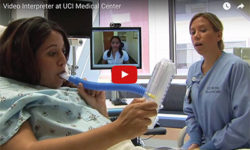Medical Telephone Interpretation- Conversation that takes place between patient and provider via telephone.
With increasing frequency, medical interpreters are requested to perform interpretation via telephone. In many cases, full-time staff interpreters at health care organizations are asked to provide telephone interpreting services. This is sometimes requested as a measure to cut down on interpreter travel time between one building to another, or to provide interpreting services for situations in which visual information will not be conveyed (conversations that take place between a patient and provider via telephone). Telephone interpreting is also requested for settings in which it would be preferable for the interpreter not to be present during the encounter (for example, where the patient’s privacy or modesty is of extra importance), and for urgent scenarios when an interpreter is needed quickly.
In some cases, telephone interpreting is also used as an alternative to on-site interpreting, especially for languages that are less commonly requested. Even if you do not perform telephone interpreting, it is helpful to be informed about this modality and its role within the greater realm of interpreting in health care.
The interpreters may be located in a central location, such as a call center or office. Or, they may work from home offices that are dispersed across a wide geographic area. Interpreters may not necessarily be located in the same country in which the provider is located. Some providers have global workforces and offices in various countries. Also, in the United States, it is increasingly common for hospitals and health care systems that employ interpreters to ask them to log on and provide telephone interpreting when they are not in person with providers and patients. Many hospitals are now setting up internal call centers that specialize in providing telephone interpreting.
Is telephone interpreting inferior in quality to inperson or video interpreting?
The quality of interpreting services, no matter what the medium of delivery, depends greatly on the interpreters in question and the level of training and quality assurance offered. Quality in all modalities of interpreting depends on the training and skills of interpreters.
Quality can be measured in a number of ways. For efficient and effective communication to take place through telephone interpreting, three key factors are usually taken into account by end users: (1) the skills and knowledge of the interpreters who provide the services, (2) the sound quality, and (3) the speed with which the interpreter is connected to the line. However, the quality of the communication is also greatly impacted by (4) the end user’s ability to work effectively with the interpreter.




